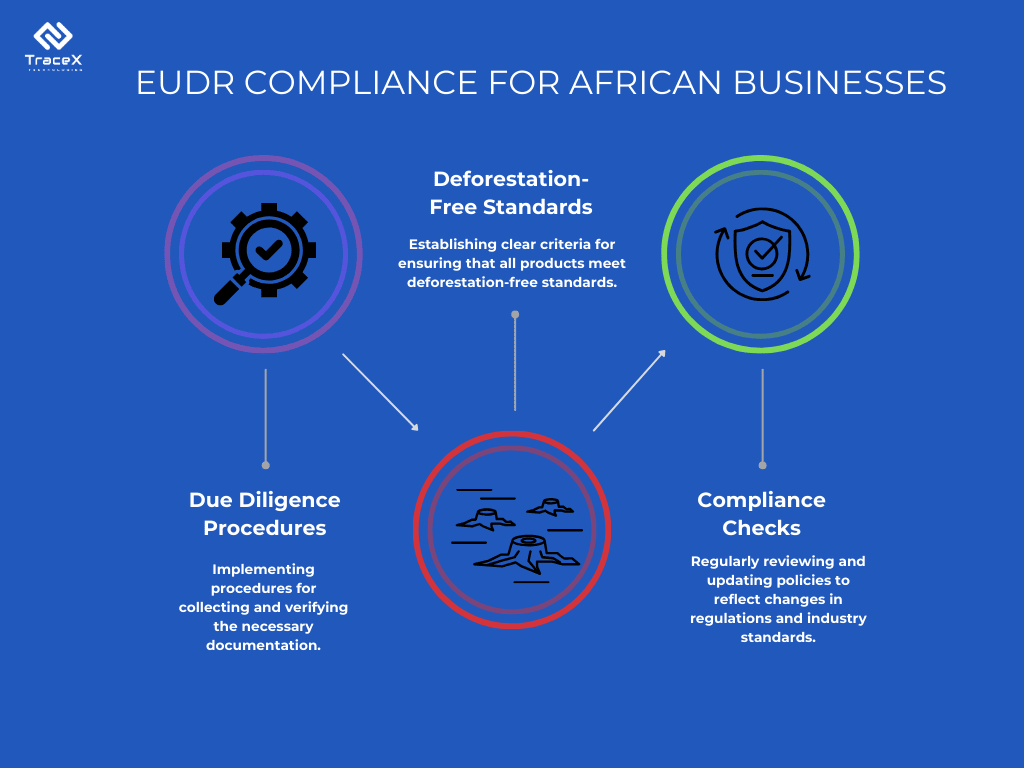Contact: +91 99725 24322 |
Menu
Menu
Quick summary: Explore how African businesses can effectively navigate EUDR compliance with our comprehensive guide. Learn about the key requirements, challenges, and practical strategies to ensure your supply chain meets EU regulations. Discover actionable steps for certification, reporting, and due diligence, and see how leveraging technology and stakeholder engagement can enhance your compliance efforts and support sustainability goals.

The EU Deforestation Regulation (EUDR), effective June 29, 2023, is a landmark piece of legislation aimed at eliminating deforestation from global supply chains. This regulation requires that certain commodities, such as cocoa, coffee, and palm oil, must not only be deforestation-free but also compliant with the relevant laws of their country of origin. EUDR Compliance for African businesses is a key requirement as they are major players in the production of these high-risk commodities.
A recent study has revealed the profound impact of deforestation on Africa’s tropical montane forests, showing that tree loss has significantly increased temperatures and cloud base height (CBH), effects that exceed those of climate change alone. The research highlights the urgent need to combat deforestation in these vital ecosystems, emphasizing the threats posed to biodiversity and water resources in the region.
The EU Deforestation Regulation (EUDR) is a groundbreaking initiative aimed at addressing global deforestation by curbing the trade of commodities linked to forest destruction. Its primary objective is to ensure that products sold in the EU are not associated with deforestation or forest degradation. This regulation is part of a broader commitment under the EU Green Deal to promote sustainable land use and preserve vital ecosystems.
The EUDR sets stringent criteria for commodities entering the EU market. It mandates that these products must be deforestation-free, meaning they should not contribute to deforestation or forest degradation, either directly or indirectly. This is to ensure that the environmental footprint of products is minimized and that businesses are accountable for their supply chains’ impacts on global forests.
Article 3 of the EUDR is pivotal. It stipulates that certain high-risk commodities and their derivatives cannot be placed on the EU market or exported unless they meet specific conditions:
For African businesses, the EUDR presents a dual challenge. On one hand, it imposes rigorous standards that must be met to access the lucrative EU market. On the other hand, it offers an opportunity to position themselves as leaders in sustainable practices. Compliance with the EUDR requires a comprehensive understanding of both international regulations and local legislative landscapes, which can be demanding but is crucial for maintaining market access and enhancing brand reputation.
African countries are major producers of several high-risk commodities covered by the EUDR, including:
Cocoa: Often sourced from regions with significant deforestation risks, cocoa production must demonstrate that it does not contribute to forest loss. This requires robust traceability and transparency measures.
Cocoa, a key crop for Ghana’s economy, is often sourced from regions with high deforestation risks. The country’s rich cocoa farms are essential to global production, but they face scrutiny under regulations like the EU Deforestation Regulation (EUDR), which aims to ensure that commodities like cocoa do not contribute to forest loss.
Coffee: As one of the most important export commodities for many African nations, coffee producers must ensure that their supply chains are deforestation-free and comply with local environmental laws.
Palm Oil: Given the environmental concerns associated with palm oil production, particularly in countries like Nigeria and Ghana, businesses must adopt sustainable practices and provide verifiable evidence of compliance with EUDR standards.
For these commodities, the EUDR necessitates a detailed examination of supply chains, from production to export. African businesses must invest in systems and technologies that enable them to track and document the origin of their products, ensuring they meet EUDR requirements. This not only helps in regulatory compliance but also promotes sustainability and contributes to the preservation of Africa’s rich biodiversity.
For many African businesses, managing a supply chain that spans vast and diverse regions poses significant challenges. In countries where agricultural practices are often fragmented and supply chains are complex, collecting accurate data becomes a monumental task. This complexity is exacerbated by the variety of stakeholders involved, from smallholder farmers to large export companies, each contributing to different stages of the supply chain.
Traceability, which is crucial for compliance with the EU Deforestation Regulation (EUDR), requires detailed tracking of products from their source to their final destination. However, in many African contexts, the infrastructure for such meticulous tracking is underdeveloped. Businesses often struggle to obtain reliable data on the exact origin of their commodities, the conditions under which they were produced, and their journey through the supply chain. This lack of transparency makes it challenging to prove that products are deforestation-free and comply with EUDR standards.
African businesses face the additional challenge of aligning with a complex web of local laws while adhering to the EU Deforestation Regulation. Each country has its own set of regulations concerning land use, environmental protection, and labor rights. For businesses operating across multiple countries, understanding and integrating these diverse legal requirements with EUDR compliance can be overwhelming.
Local legislation may vary significantly, and businesses must stay abreast of changes in regulations that impact their operations. Integrating these local laws with EUDR requirements demands a nuanced approach. Companies need to develop internal systems that not only comply with EUDR but also respect and incorporate local regulations. This integration often requires expert legal and regulatory knowledge, which can be challenging to acquire and manage.
One of the most pressing issues for African businesses is the limitation of digital infrastructure and technology. Many regions still lack the advanced digital tools necessary for efficient tracking, reporting, and compliance. The absence of robust IT systems can hinder a company’s ability to collect and analyze data effectively, impacting their ability to meet EUDR requirements.
For instance, digital platforms for tracking the provenance of commodities, managing supply chain data, and ensuring compliance are not always available or affordable. Businesses may struggle with outdated or inadequate technology, which impedes their ability to implement effective traceability systems. Without the right tools, maintaining transparency and providing the necessary evidence to prove compliance with EUDR can be exceptionally challenging.
Technology plays a crucial role in navigating the complexities of EUDR compliance. For African businesses, adopting advanced digital solutions can significantly enhance traceability and transparency across supply chains.
Effective compliance with EUDR requires active engagement with all stakeholders involved in the supply chain. For African businesses, this means building strong relationships with suppliers, local communities, and customers. Working closely with suppliers ensures that they understand and adhere to EUDR requirements. Training programs and workshops can help suppliers implement sustainable practices and comply with documentation requirements. By fostering a collaborative approach, businesses can improve traceability and support suppliers in meeting regulatory standards. Engaging local communities is vital, particularly in areas where deforestation risks are high. Businesses should invest in community development programs that promote sustainable land use and provide resources for local conservation efforts.
Forming partnerships with local governments and non-governmental organizations (NGOs) can provide valuable support in navigating the regulatory landscape. Local governments can offer insights into regional regulations and assist with compliance efforts, while NGOs can provide expertise in environmental conservation and sustainable practices. Collaborating with these entities can help businesses stay informed about regulatory changes, access resources, and implement effective compliance strategies.
Creating robust internal policies is essential for EUDR compliance. Policies should be comprehensive, addressing all aspects of the supply chain and integrating both EUDR requirements and local regulations.
Discover how a Nigerian Trading Company transformed its EUDR compliance process with TraceX’s innovative platform. By leveraging our advanced traceability and due diligence tools, they streamlined their supply chain management, ensuring complete transparency and compliance with EU regulations. From simplifying data collection to enhancing verification and reporting, TraceX empowered them to confidently navigate the complexities of EUDR.
Obtaining EUDR certification is a crucial step for African producers aiming to access the EU market. The journey begins with understanding the certification criteria, which include ensuring that your products are deforestation-free and that your supply chain is transparent. Start by mapping out your entire supply chain, gathering necessary documentation from suppliers, and verifying their compliance with both local and EU regulations. Next, undergo an external audit by a recognized certification body to validate your practices. Once certified, maintain ongoing compliance through regular monitoring and updates to ensure your practices continue to meet EUDR standards. This process not only opens doors to the European market but also demonstrates your commitment to sustainable practices.

EUDR Reporting Requirements for African Companies
Reporting under the EU Deforestation Regulation (EUDR) involves more than just submitting documents; it’s about building trust through transparency. African companies must provide detailed reports that include evidence of compliance with deforestation-free requirements, such as documentation on the origin of commodities and environmental impact assessments. Regular updates on supply chain practices and any changes must also be communicated. Engaging with stakeholders through clear and honest reporting not only ensures regulatory adherence but also enhances your company’s reputation in the global market. By embracing transparency, you can foster stronger relationships with customers and regulators alike.
Effective due diligence under the EUDR requires a proactive approach to managing and verifying your supply chain.
By integrating these best practices into your operations, you not only achieve compliance but also contribute to broader sustainability goals and build a resilient, trustworthy supply chain.
Wrapping up, it’s clear that EUDR compliance is both a significant challenge and a valuable opportunity for African businesses. Navigating these regulations may seem daunting, but with the right approach, it can lead to transformative benefits. Understanding EUDR’s goals, mapping your supply chain with precision, and committing to thorough due diligence are crucial steps. Embracing technologies like blockchain and engaging deeply with your stakeholders will not only help you meet compliance requirements but also showcase your dedication to sustainability.
